Suchergebnisse
Flucco+ - Flexibler NutzerInnenkomfort in viertelstündlich CO2-neutralen Plusenergiequartieren
Ziel des Projekts ist die Verbesserung der Planungsgrundlagen für die Errichtung und den Betrieb energieflexibler Bestands- und Neubauten in drei konkreten Bereichen. Erstens der Weiterentwicklung bestehender Modelle thermischen Komforts für dynamische Situationen, zweitens der Quantifizierung zukünftiger Netzdienlichkeit und drittens der holistischen Erprobung des entwickelten Komfort- und CO2-Modells an drei potentiellen Plusenergiequartieren unter Berücksichtigung der Ökobilanz sowie der Lebenszykluskosten.
Flucco+ - Flexible user comfort in quarter-hourly CO2-neutral Positive Energy Districts (PED)
The aim of the project is to improve the planning basis for the construction and operation of energy flexible buildings in three specific areas. First the further development of existing models of thermal comfort for dynamic situations, second the quantification of future energy grid usefulness and third the holistic testing of the developed comfort and CO2 model at three potential positive energy districts (PED), taking into account the ecological assessment as well as the life cycle costs.
Smart Pölten 2.0 - Ganzheitliche Betrachtung einer Vertical Farm in Vorbereitung eines Demonstrationsprojektes in St. Pölten
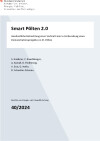
Die Stadt St. Pölten sieht in Vertical Farming großes Potential hinsichtlich der Ziele des Smart City-Konzeptes durch die Verknüpfung von lokaler Lebensmittelproduktion, Lebensqualität und Reduktion des Ressourcenverbrauchs. Um dieser Zielsetzung gerecht zu werden sollen Vertikale Farmen an Bestandsgebäuden entwickelt werden. Öko-soziale und sozio-ökonomische Betrachtungen spielen hierbei mit eine tragende Rolle.
Schriftenreihe
40/2024
S. Haiderer, C. Rauchberger, A. Kumpf, D. Podmirseg, V. Enzi, G. Hofer, D. Schneller-Scharau
Herausgeber: BMK
Deutsch, 149 Seiten
Downloads zur Publikation
Essbare Seestadt - Grüne Seestadt - Lernen für die essbare Stadt der Zukunft
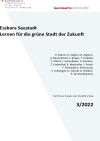
Das Projekt "Essbare Seestadt" ermittelt, welchen Beitrag verdichtete urbane Nahrungsmittelproduktion zu einem klimaneutralen, resilienten Stadtteil leistet bzw. leisten kann und wie dieser Beitrag nachhaltig stabilisiert bzw. optimiert werden kann.
Schriftenreihe
3/2022
D. Marek, D. Ziegler, M. Angerer, A. Bauernfeind, C. Berger, T. Drapela, C. Fötsch, I. Gusenbauer, S. Kummer, T. Lindenthal, R. Mayrhofer, J. Posch, F. Reinwald, K. Rimanoczy, S. Schweiger, D. Stanzel, B. Waltner, R. Weichselbaumer
Herausgeber: BMK
Deutsch, 209 Seiten
Downloads zur Publikation
Hocheffiziente Fassaden- und Dachbegrünung mit Photovoltaik-Kombination. Optimale Lösung für die Energieeffizienz in gesamtökologischer Betrachtung (GrünPlusSchule@Ballungszentrum)
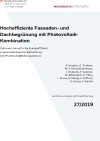
Im Rahmen dieses Projektes wurden an einer Wiener Schule unter Einbindung von SchülerInnen, unterschiedliche Gebäudebegrünungs-Systeme und Pflanzen-/Substratarten, kombiniert mit verschiedenen PV-Modulen, untersucht und ihre Einflüsse auf das hygrothermische Verhalten der Gebäude, Energiesparpotential, Raumluftqualität, Luftfeuchtigkeit, Beschattung, Lärmminderung, Wasserrückhaltung und des Wärmeinseleffekts wissenschaftlich erläutert.
Schriftenreihe
27/2019
A. Korjenic, D. Tudiwer, M. S. Penaranda Moren, J. Hollands, T. Salonen, M. Mitterböck, U. Pitha, I. Zluwa, R. Stangl, J. Kräftner, K. Gump, G. Becker
Herausgeber: BMVIT
Deutsch, 137 Seiten
Downloads zur Publikation
Raum & Grün - Möglichkeiten zur Integration von Begrünung ins Regelwerk der österreichischen Raumordnung
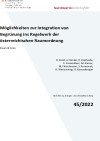
In der F&E-Dienstleistung „Raum & Grün“ wurde eine Studie erstellt, welche die Zusammenhänge zwischen Raumordnung und Begrünung abbildet, den Handlungsbedarf sowie -spielraum von Akteurinnen und Akteuren zeigt sowie konkrete Empfehlungen formuliert, wie innovative Stadtbegrünungen und Bauwerksbegrünungen effektiv in das Regelwerk der österreichischen Raumordnung und Raumplanung verankert werden können.
Schriftenreihe
45/2022
B. Knoll, A. Renkin, R. Dopheide, E. Knasmillner, M. Karner, M. Fleischmann, S. Formanek, R. Werluschnig, G. Kienastberger
Herausgeber: BMK
Deutsch, 92 Seiten
Downloads zur Publikation
Innovationen für die grüne, smarte Stadt der Zukunft! GRÜNSTATTGRAU - Das grüne Innovationslabor
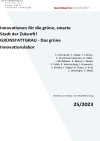
GRÜNSTATTGRAU ist die ganzheitliche Kompetenzstelle für Bauwerksbegrünung in Österreich: Sie gibt Impulse und vernetzt innovative Produkte und Projekte, liefert Know-How und Analysen für die Praxis und begleitet urbane und partizipative Entwicklungsstrategien bis zur Umsetzung.
Schriftenreihe
25/2023
S. Formanek, T. Szalay, T. Lošonc, E. Gruchmann-Bernau, G. Hofer, I. Mühlbauer, K. Mauss, I. Zluwa, S. Telek, R. Werluschnig, I. Haymerle, S. Kotrba, L. Steger, B. Seyer, V. Enzi, L. Steininger, T. Matić
Herausgeber: BMK
Deutsch, 225 Seiten
Downloads zur Publikation
Biotope City – Bauanleitung für die grüne Stadt der Zukunft
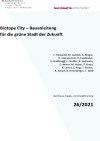
"Biotope City" ist ein Projektleitbild für die Umsetzung umfassender urbaner Begrünung mit dem Ziel, die regenerativen Mechanismen der Natur zu nutzen. So soll die Lebensqualität umfassend, nachhaltig und kosteneffizient erhöht und Resilienz gegen Wetterextreme in Städten verbessert werden. Zentrale Zielsetzung des Projekts ist die Generierung von Bestandteilen einer realitätsgerechten, verallgemeinerbaren und übertragbaren Bauanleitung für die grüne Stadt der Zukunft.
Schriftenreihe
26/2021
F. Reinwald, M. Auböck, A. Berger, D. Damyanovic, H. Fassbinder, A. Graßmugg, E. Gruber, R. Gutmann, S. Hafner, M. Huber, F. Kraus, R. Lainer, Z. Ring, T. Romm, B. Scharf, B. Unterberger, T. Wolf
Herausgeber: BMK
Deutsch, 185 Seiten
Downloads zur Publikation
Sondierung für die Entwicklung von moosbewachsenen Gebäudefassadenpaneelen (BE-MO-FA)
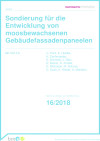
Sondierung für die Entwicklung von moosbewachsenen Fassadenpaneelen durch Auswahl und Erprobung von geeigneten Moosarten, neuen Feuchtespeicher- und Haftsubstraten, Materialien für Tragpaneele und hochbautechnischen Konstruktionsdetails Für ganzjährig grüne, dauerhafte, pflegeextensive und kostengünstige Gebäudefassaden.
Schriftenreihe
16/2018
U. Pont, E. Heiduk, H. Zechmeister, S. Schmidt, J. Gätz, D. Moser, K. Zmelik, D. Wolosiuk, M. Schuss, C. Sustr, K. Kiesel, A. Mahdavi
Herausgeber: BMVIT
Deutsch, 143 Seiten
Downloads zur Publikation
KELVIN - Reduktion städtischer Wärmeinseln durch Verbesserung der Abstrahleigenschaften von Gebäuden und Quartieren
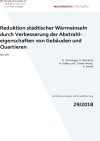
Potentialabschätzung einer möglichen Abschwächung des Auftretens städtischer Wärmeinseln durch die Veränderung der Oberflächenalbedo unterschiedlicher Stadtstrukturen (Boden, Dachflächen, Dachbegrünung etc.) bzw. damit verbundener Energieeinsparung durch Reduktion des Kühlungsbedarfs und Emissionsreduktion, um positive Auswirkungen auf Gesundheit und Lebensqualität (Human- und Wohnkomfort) in Städten zu ermöglichen.
Schriftenreihe
29/2018
H. Schwaiger, D. Neil Bird, H. Gallaun, M. Zuvela-Aloise, K. Andre
Herausgeber: BMVIT
Deutsch, 97 Seiten
Downloads zur Publikation
50 grüne Häuser - Entwicklung und Demonstration eines Low-Tech-Grünfassadensystems
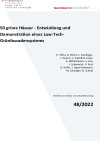
Entwicklung einer kostengünstigen gewerke- und prozessübergreifenden All-In Gebäudebegrünung inkl. Wartungskonzept ("Greening-Toolkit") zur breiten (vor allem straßenseitigen) Implementierung auf Fassaden im städtischen Bestand, kombiniert mit einer Prozessinnovation zur Vereinfachung aller notwendigen Abstimmungsprozesse.
Schriftenreihe
48/2022
U. Pitha, O. Weiss, C. Dantinger, J. Dunzer, C. Kaindl, B. Kainz, A. Mitterhauser, S. Lins, J. Schwanzer, V. Enzi, G. Hofer, S. Jäger-Katzmann, M. Lanzinger, B. Schoas
Herausgeber: BMK
Deutsch, 100 Seiten
Downloads zur Publikation
3Sat Dokumentation zu urbaner Überhitzung mit Projekten aus Stadt der Zukunft
3Sat beleuchtet in der Dokumentation „Heißes Pflaster Stadt - Warum wir mehr Pflanzen brauchen“ Maßnahmen gegen urbane Überhitzung und nimmt dabei Bezug auf Stadt der Zukunft-Projekte. Die Erstausstrahlung erfolgte am 12.12.2018 um 20.15 Uhr.
PVOPTI-Ray: Optimierung reflektierender Materialien und Photovoltaik im Stadtraum bezüglich Strahlungsbilanz und Bioklimatik
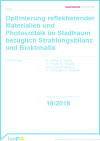
Im Rahmen des Projektes PVOPTI-Ray wurde der Einfluss der Reflexion und der Strahlungsbilanz in städtischem komplexem Gelände auf die Performance von fassadenintegrierter Photovoltaik (PV) untersucht. Ebenso wurde der Einfluss der Solarmodule und der Strahlungswandlung an Solarmodulen auf das Stadtklima analysiert.
Schriftenreihe
18/2018
P. Weihs, S. Zamini, S. Krispel, S. Oswald, M. Peyerl, M. Revesz, A. Schneider, H. Trimmel
Herausgeber: BMVIT
Deutsch, 98 Seiten
Downloads zur Publikation
Urbane Grünraumpotenziale iM verBauten BestAnd (Urbane GmbA)
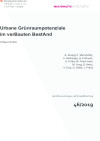
Urbane GmbA hat zum Ziel, das Grünflächenpotenzial am Gebäude- und im verbauten Bestand (vertikal und horizontal) in Wien zu sondieren, verfügbare Erhebungsinstrumente in den Projektgebieten anzuwenden und Forschungs- und Entwicklungsbedarfe für grüne Infrastrukturen aufzuzeigen.
Schriftenreihe
46/2019
R. Stangl, P. Minixhofer, S. Hörbinger, G. Frühwirt, U. Pitha, W. Friesl-Hanl, M. Jung, G. Heiss, V. Enzi, G. Hofer, J. Preiss
Herausgeber: BMVIT
Deutsch, 133 Seiten
Downloads zur Publikation
greening UP! Nachhaltige Grünpflege, Wartung, Instandhaltung von Vertikalbegrünungen inklusive rechtlicher Aspekte
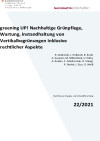
Im Projekt wurden aufbauend auf umfassenden Erhebungen und Analysen von bestehenden vertikalen Gebäudebegrünungen in Außenräumen (boden- und systemgebundene Fassadenbegrünungen) und vertikalen Innenraumbegrünungen passgenaue Grünpflege-, Wartungs- und Instandhaltungskonzepte erarbeitet und rechtliche Aspekte adressiert. Der "greening UP!"-Wissenspool mit konkreten Empfehlungen und anschaulich aufbereitetem Wissen sowie die Konzeption eines digitalen Tools zur "Ersten Grünen Hilfe" runden das Projekt ab.
Schriftenreihe
22/2021
R. Dopheide, J. Hollands, B. Knoll, A. Korjenic, M. Mitterböck, U. Pitha, A. Renkin, F. Schiefermair, R. Stangl, P. Skolek, I. Süss, O. Weiß
Herausgeber: BMK
Deutsch, 162 Seiten
Downloads zur Publikation
Vertical Farming: Ermittlung der Anforderungsbedingungen zur Entwicklung eines Vertical Farm-Prototyps zur Kulturpflanzenproduktion
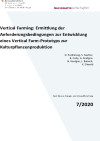
Im Mittelpunkt stand die Erforschung von Grundlagen für eine neue Gebäudetypologie, der Vertikalen Farm. Urbane vertikale Lebensmittelproduktion kann zur Steigerung der Energieeffizienz von und zur Reduktion des Landverbrauchs durch Städte beitragen. Wesentliche Einflussfaktoren zur Erreichung dieser Ziele werden durch diese Grundlagenforschung offen gelegt.
Schriftenreihe
7/2020
D. Podmirseg, S. Sautter, B. Cody, A. Keutgen, N. Keutgen, J. Balasch, K. Diwold
Herausgeber: BMK
Deutsch, 91 Seiten
Downloads zur Publikation
Raum & Grün - Möglichkeiten zur Integration von Begrünung ins Regelwerk der österreichischen Raumordnung
In der F&E-Dienstleistung „Raum & Grün“ wurde eine Studie erstellt, welche die Zusammenhänge zwischen Raumordnung und Begrünung abbildet, den Handlungsbedarf sowie -spielraum von Akteurinnen und Akteuren zeigt sowie konkrete Empfehlungen formuliert, wie innovative Stadtbegrünungen und Bauwerksbegrünungen effektiv in das Regelwerk der österreichischen Raumordnung und Raumplanung verankert werden können.
GRÜNSTATTGRAU - Innovationen für die grüne Stadt "Das grüne Innovationslabor"
GRÜNSTATTGRAU ist die ganzheitliche Kompetenzstelle für Bauwerksbegrünung in Österreich: Sie gibt Impulse und vernetzt innovative Produkte und Projekte, liefert Know-How und Analysen für die Praxis und begleitet urbane und partizipative Entwicklungsstrategien bis zur Umsetzung.
GrünStattGrau – Innovations for Greening Cities "The green living laboratory"
GrünStadtGrau represents the holistic of competence for green building technologies such as green roofs and living walls in Austria. It generates impulses for urban green infrastructure on buildings and links innovative products and projects, supports through know-how and analysis for implementation processes. GrünStattGrau guides urban and participatory strategies from development to implementation.
Space & Green. Possibilities for integrating greening into the regulations of Austrian spatial planning
The R&D service "Raum & Grün" (Space & Green) prepared a study that depicts the interrelationships between spatial planning and greening, shows the need for action and the scope for action by actors, and formulates concrete recommendations on how innovative urban greening and greening of buildings can be effectively anchored in the regulations of Austrian spatial planning.
